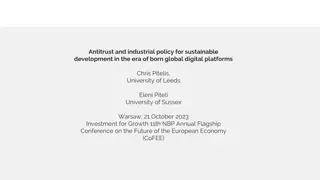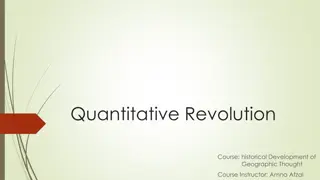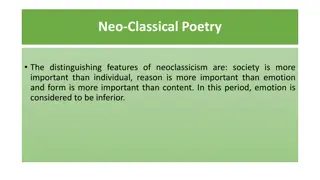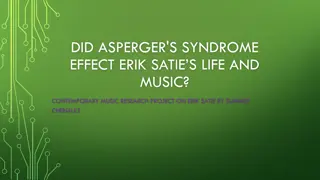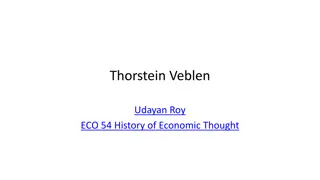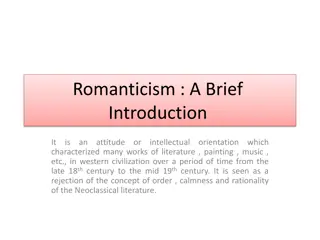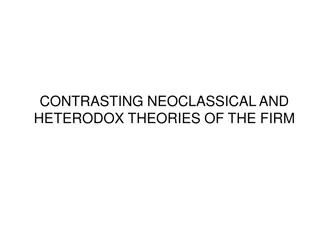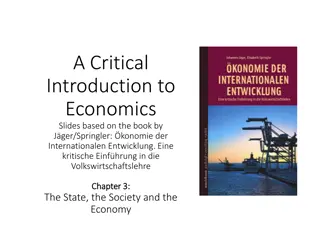Sustainable Development and Industrial Policy in the Era of Digital Platforms
The presentation discusses antitrust and industrial policy for sustainable development in the context of born global digital platforms. It covers neoclassical economic approaches, policy interventions for market failures, and organizational economics, focusing on value creation at different levels.
0 views • 11 slides
Understanding the Theory of Firms: Neoclassical vs. Modern Approaches
The theory of firms is explored through the Neoclassical and Modern perspectives. Neoclassical theory focuses on profit maximization, while Modern theory delves into managerial, principal-agent, and transaction cost theories. The discussion covers criticisms of Neoclassical theory and the essential
1 views • 79 slides
Evolution of Geographic Thought: Quantitative Revolution
The Quantitative Revolution in Geography, led by Schaefer's critique of traditional views, propelled the shift towards a more objective and scientific approach. Embracing statistical and mathematical techniques, geographers sought regularities in spatial organization, marking a transition from areal
1 views • 11 slides
Neo-Classical Poetry: Features and Characteristics
Neoclassical poetry emphasizes society over the individual, prioritizes reason over emotion, and values form over content. Poets must focus on universal themes, reflect nature objectively, and uphold didacticism by teaching moral and intellectual lessons. The era's poets are considered craftsmen who
1 views • 5 slides
The Influence of Asperger's Syndrome on Erik Satie's Life and Music
Erik Satie, a French neoclassical composer, displayed eccentric traits and his music was initially deemed odd but later revered. Researchers suggest he exhibited characteristics of Asperger's Syndrome. Satie's early life, challenges with formal music education, and unique style in the neoclassical e
0 views • 15 slides
Thorstein Veblen: Critic of Capitalism and Founder of American Institutionalism
Thorstein Veblen, a key figure in the history of economic thought, criticized capitalism for its rough and monopolistic nature. He founded the American Institutionalism School and challenged neoclassical economics' view of rational consumer behavior and business motivations. Veblen's analysis focuse
0 views • 23 slides
Understanding Romanticism: A Brief Introduction to Literary Movement
Romanticism, a significant literary movement from the late 18th to mid-19th century, emphasized individuality, subjectivity, emotion, and the supernatural. It marked a departure from Neoclassical ideals of order and rationality. Key characteristics include subjectivity, spontaneity, love of the supe
0 views • 8 slides
Contrasting Neoclassical and Heterodox Theories of the Firm
Conceptualizing markets and organizations through the lens of neoclassical and heterodox theories, Herbert Simon's perspective highlights the dominance of organizations in modern economies. He challenges the conventional view of a market economy by emphasizing the significant role of organizations a
0 views • 30 slides
Understanding the Interaction of States, Societies, and Economies
Explore the relationships between states and markets through the lenses of neoclassical economics, Keynesianism, and political economy. Delve into the concepts of market imperfections, state failure, and the preconditions for perfect markets, shedding light on key economic policies and theoretical f
0 views • 19 slides
Understanding Our Political Economy Through Economic Theory and Price Mechanism
Explore the intricate dynamics of political economy through neoclassical economic theory, price mechanism analysis, and the role of land as a factor of production. Delve into concepts like labor demand, capital goods, credit markets, and the limitations of the price mechanism in certain contexts. In
0 views • 30 slides
